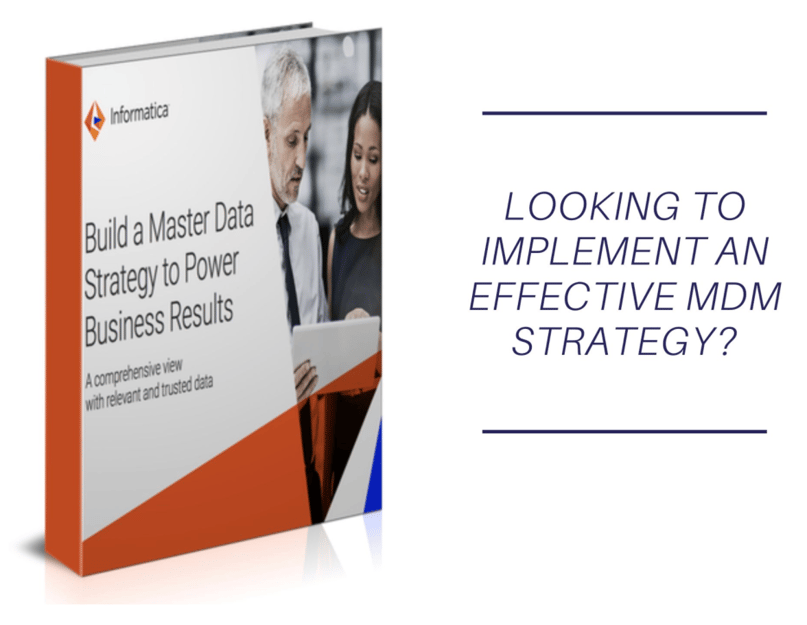
Image by Nick Youngson CC BY-SA 3.0 Alpha Stock Images
Master Data: With Great Power...
Traditionally, an asset is a resource with economic value that an individual, corporation, or country owns with the expectation that it will provide future benefits. An asset could provide benefits such as stability, the generation of cash flow, expense reductions, improving sales, and so on.
The motives for owning an asset are endless. Over the past century, commodities such as gold, the US dollar, oil, bonds, real estate, and blue-chip stocks were vital assets at the height of their power.
When we fast forward to the present day, data has become the single most powerful and dominating force. Data has the ability to transform a garage or dorm room tech start-up into a trillion-dollar tech company.
Consider that Amazon doesn’t have a retail shop, Facebook and Twitter do not have people meeting up in person, the most ridden cab service (Uber) doesn’t own a single cab, and the most popular hotel rooms are by Airbnb, who doesn’t own a single room! Yet the common entity among all these success stories is ‘data.' What these companies have in common is the data to understand and serve their customers. With data, these companies learn and predict the needs, necessities, hobbies, passion, and aspirations that define their customer base, in order to bring the services that customers desire right to their fingertips.
Contrarily, breaches or improper usage of the very same data that creates so much success can cause companies to go bankrupt. due to crackdowns by regulatory bodies, due to lawsuits, or from a loss of trust in the company from customers and investors. Data has even gone as far as impacting the results of national elections in some countries. Observably, the power of data seems not to have any bounds in fueling success or ushering in failure.
Logically, data that’s mastered, carefully curated, and well-governed can provide endless opportunities. This makes Master Data a vital corporate and strategic asset to companies and businesses. Master Data can make or break a company. In fact, a survey conducted by the Financial Education & Research Foundation (FERF) in 2019 showed that more than 80 percent of organizations reported 'viewing data' as a strategic asset.
In summary? Good management of data can propel your business forward, positioning your company as a front runner in the market, where bad data management can render a company irrelevant in today’s data-driven world.

Master Data: The Strategic Asset
A business strategy is a set of guidelines and procedures created to reach a specific business goal within a pre-defined timeframe. More often than not, a lack of a coherent strategy is the main reason companies fail. Therefore, designing a sound strategy and executing it well are essential milestones towards success.
Data is no different. A well-thought-out Master Data program can be a potent weapon that will come handy while designing business strategies. Business strategies built on a foundation of strong master data will be trusted, objective, coherent, and agile. Curious why? Let’s take a look at how master data can contribute to each of these features.
Trust: Trusted data yields trusted insights. Strategies based on master data are clear, understandable, and trusted by all levels of management because they are based on trusted, credible data. Therefore Insights derived using master data are more likely to succeed. Master data is the most trusted data source in an enterprise, acting as the backbone for the organization’s strategies and a road map for growth. For instance, a budget allocation strategy designed using master data about customers' demography, product, and suppliers will be more effective than a strategy based on data from a random survey or historical sales information.
Objectivity: Master Data system acting as a single source of truth for the enterprise's business-critical data. It can be a gold mine of information for strategists to leverage. Well-informed strategists can be objective and goal-oriented while designing strategies that align with the enterprise’s business goals and objectives.
Coherence: MDM’s 360 degree-view provides wholistic information to all stakeholders in charge of strategy and planning, enabling them to be coherent and logical while making strategic business decisions. Informatica Master Data Management's built-in security features and access levels can make the same information available to all employees that execute, implement these strategies, and thus aligns all levels of the organization structure to work in cohesion to realize the enterprise goals.
Agility: Strategies built with master data are agile, easily scalable, and provide greater adaptability and flexibility as per volatility in the market, competition, and industry advancements. Since a master data program (equipped with real-time processing) can provide information about a real-time situation, strategists can swiftly analyze contingencies and act pro-actively to mitigate the negative impact on a business.
Are you starting to see how master data can be a vital strategic asset that is the difference between market pioneers and market followers?

Master Data: The Corporate Asset
In the traditional sense, corporate assets are defined as people, products, property, and company reputation. In today’s digital world, the information related to these assets can be stored as master data in a single source of truth with an MDM program. This means master data encompasses all traditional corporate assets and acts as a super-corporate asset, driving enterprise strategies and digital transformations.
Gartner predicts that by 2022, companies' information portfolios could be one of the parameters for evaluating their market value and overall worth. Gartner even advises using its Information Valuation Method to value information assets much like other enterprise assets. It has also stated, “Those in the business of valuing corporate investments, including equity analysts, will be compelled to consider a company’s wealth of information in properly valuing the company itself.” Like the old saying, “All roads lead to Rome,” in today’s world all roads lead to one eventuality: where data, sooner or later, will be recorded as a corporate asset.

Conclusion
Master data contributes a great deal to the health and well-being of organizations and can be a real game-changer for company fortunes. With all the potential that master data possesses, it is an indispensable strategic and corporate asset for businesses. We will all probably witness a day when enterprises will be saying one thing about master data: ‘My Precious.’

Posted by PDI Marketing Team
Pacific Data Integrators Offers Unique Data Solutions Leveraging AI/ML, Large Language Models (Open AI: GPT-4, Meta: Llama2, Databricks: Dolly), Cloud, Data Management and Analytics Technologies, Helping Leading Organizations Solve Their Critical Business Challenges, Drive Data Driven Insights, Improve Decision-Making, and Achieve Business Objectives.





